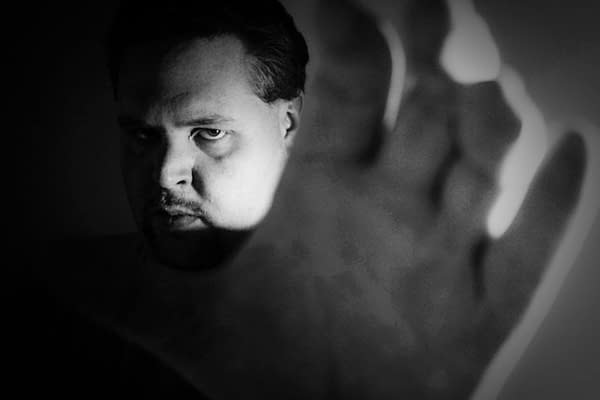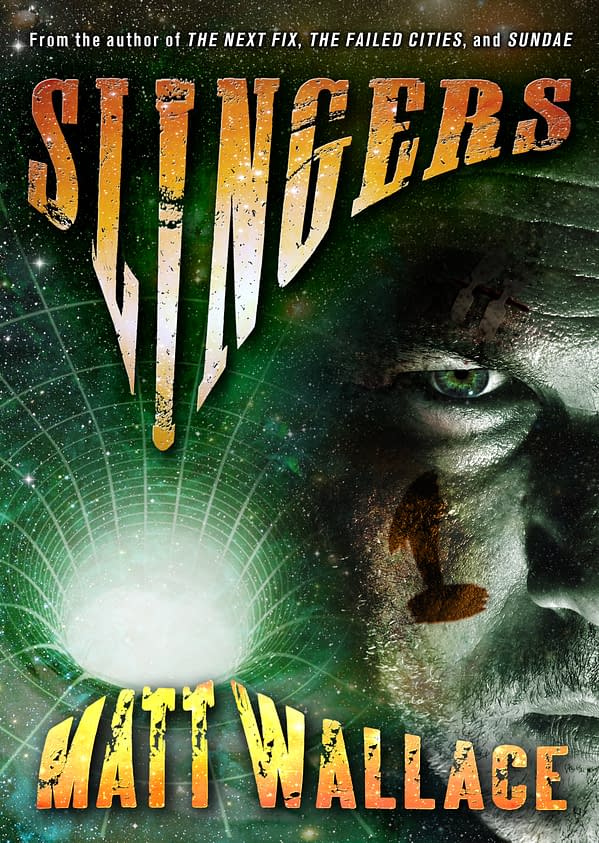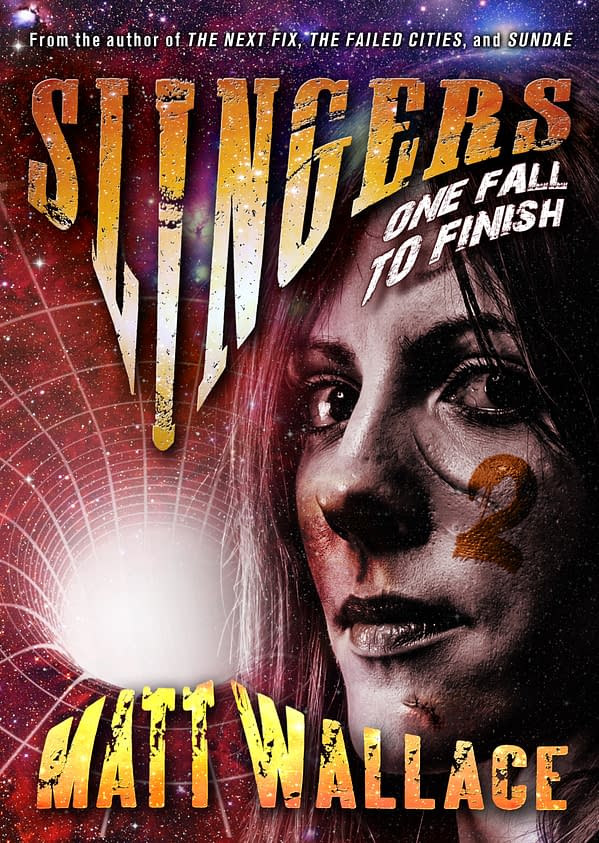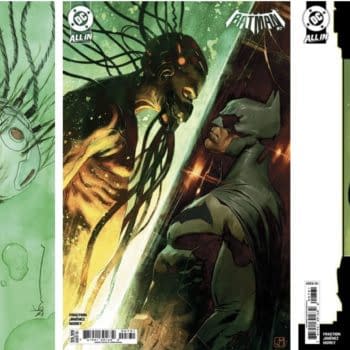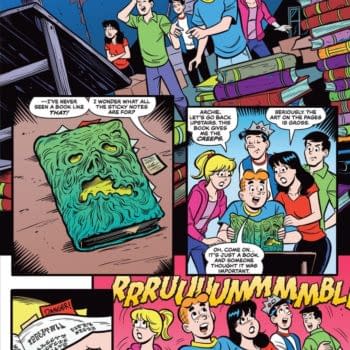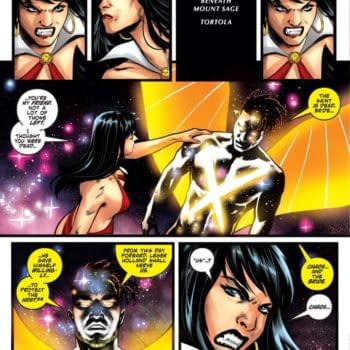Posted in: Comics, Recent Updates | Tagged: ebooks, entertainment, science fiction
Einstein-Rosen Blackbelts: Matt Wallace Talks Slingers And Ebook Publishing
By Alasdair Stuart
Matt Wallace is a pioneer. Over the years I've known him I've seen him travel from award-winning podcaster to screenwriter, stopping off to run a fiction workshop, put words in the hard-as-nails Irish mouth of Liam Neeson and storm the indie publishing scene with his bravura novel The Failed Cities Monologues not to mention short fiction that takes in horror, cyberpunk and the single best teddy bear story ever written.
Matt does what other authors talk about. He carves his career one handful at a time and he's still here long after most of the people writing 'How To Succeed At Indie Publishing' articles have given up and got office jobs. I talked to him about his new project Slingers, indie publishing and esoteric martial arts.
Alasdair Stuart: Tell us about Slingers. What's the premise?
Matt Wallace: A close friend of mine described it as, "Judo against a black hole, and it's fucking awesome." While not entirely accurate, that description does an admirable job of challenging traditional book summaries.
The premise of Slingers is many years after the discovery of a stable wormhole and many failed, disastrous attempts to control, monetize, and militarize said wormhole a death sport was created around it and has become *the* global competitive event. But the story is actually about the world that has evolved around the sport, particularly the space station where the arena resides, and the people who live in that world.
It focuses on The Reapers, a competing team in the games. Its members, including the titular slingers, are dealing with their mortal occupation and all its drama when they discover something is happening on the station, something that is killing the underclass that lives in its bowels and abandoned sections. Literally everyone in the world views slingers as the heroes of the age, almost Greek myths come to life. They have to decide whether that's all bullshit, or whether they really are those heroes… and how far they're willing to go to be that thing.
AS: So this is a story as much about the community as the sport. A transition from the manufactured hero's journey to an actual one?
MW: When you put it in broad literary terms like that I feel kind of full of shit, but that's actually all spot-on. The thing that fires any fictional world is the people in it (obviously), and I like to explore the affect the world has had on those people. That's the real juice for me. And the concept of "heroes" is one of the most inflated, misinterpreted, misrepresented in all of storytelling. I really wanted to screw with people's perception of that.
AS: What influenced the story?
MW: Like any other story (I gotta believe, anyway) it was the smashing together of a hundred different sources. Working with Scott Sigler on his GFL series is probably what kickstarted the whole thing. But it grew out my love of movies like Arena (my favorite bad B movie, directed by Charles Band), Death Race 2000, and Rollerball, which used violent spectacle as a vehicle for satire. And lots of mindless violence. It was also inspired by the ten thousand locker rooms I spent time in as a professional wrestler. It's the love of world building instilled in me by works like Babylon 5 and Neverwhere.
Like I said, a hundred sources smashed together. That's ultimately what storytelling is.
AS: I loved Arena. The UK equivalent of those is a lot of the stuff 2000AD has run over the decades. Huge amounts of hideous violence with a whole mess of social commentary in there as well. The series is going to look at the world of the Reapers as well as their day job?
MW: Satire and visceral violence are two of the sixty-three things I do really well (I made a list). I think this whole thing started off as being about a death sport, and then, like any story, it grew wildly beyond that. So the games are there. It's what brings everyone to the yard. The psychology of participating in them is deep in each character, but like you said it's their day job. It just so happens it can change the complexion of their lives and the story every time they go to work.
AS: It's unusual to see a futuristic sport story like this based on grappling forms. What led to that choice? A definite pushback against the increasingly tedious 'three BJJ moves of doom' school of fight choreography?
MW: I mean, I am a grappler, through and through. I was a professional wrestler for ten years. I taught grappling to my fellow workers, incorporated it in self-defense classes and combat seminars for almost as many years. I've studied catch wrestling and Judo since my teens. It's what I know, what i love. This idea started with that, and then I had to ask myself the question, "How do I make that not boring as shit to normal people?" Fortunately my brain doesn't work in the standard fashion, and the answer came back, "Have them toss each other off a narrow runway through a hole in space that spits them out above random cities on Earth where they fall spectacularly and gorily to a monumental death."
AS: There's a really interesting voice you use in the books, slightly present and slightly prescient. What led to that choice?
MW: Happenstance. In the beginning of the first ebook a character literally falls from the sky. When I wrote it I started describing the sky as part of that scene and just suddenly felt disgusted with myself. Like, "Congratulations, you've just written the ten millionth unnecessary, boring-ass description of the sky in literature." It reminded me of that George Carlin bit about writers describing clouds. So I stopped. And out of pure spite more than anything I "broke the fourth wall" and addressed the reader directly about it. It was fun. It was one of those moments when you realize there are no rules. Structure, narrative, even grammar, it's all shit we just made up and arbitrarily enforce. As long as people understand the language you're writing you can literally do anything you want. So I went with it throughout the book. It almost gave the narrative the feel of a TV pitch, or a treatment, or even a bardic quality if you want to make it classier. I ended up having a lot of fun with it, and I think it really works and sets the story apart and gives it a great verve and energy and pace. I could be wrong. But I'm not.
AS: The narrative voice reminded me of nothing more than Oz. Those early seasons with Harold Perrineau in the glass box commenting on the action. There's that same sense of narrative omniscience and white knuckled presence.
MW: I thought that was one of the best devices in any television show ever. I also thought about Christopher Titus in his own black-and-white id during the run of his sitcom Titus (forgotten classic, by the way. Innovative as shit for the time). With Slingers I'm hoping to land somewhere between the narrator of The Hitchhiker's Guide to the Galaxy and the host of You Don't Know Jack if they were commentating on a match at the Roman Coliseum. Or, you know, we could eschew filtering everything through references to other people's work and I could just try to do something wholly original. I'll work on that.
AS: There are five Slingers novels planned. Is there room for the series to grow past that?
MW: There's room for as many books as people want to buy. I love the world, and I love writing about it, so that's not an issue. The rest comes down strictly to demand. If people download the shit out of this five-ebook arc I will absolutely write more. It's entirely up to the audience. I relish the opportunity to face the kind of total story burn-out the Charlaine Harrises of the literary world have and do.
AS: Being in indie publishing, you're your own boss. With Slingers, what sort of decisions does that lead to? Will we be seeing team specific merchandise for example?
MW: I'm a stone cold sucker for "in-world" merch (I buy all my t-shirts from Last Exit to Nowhere) so I'd love to do it based on that alone. But you can't start out doing, or even thinking about crap like that. You have to get people into the story and the world before you start thinking about shit like tie-ins. That's how you end up with five hundred boxes of t-shirts no one wants to buy molding in your house. Right now I'm just focused on telling a good story people want to buy. Once I accomplish that, and the audience is asking for it, I'll think about expanding the empire.
AS: Let's talk a little about indie publishing. You, like me, came up through podcasting. What led you out into the indie side of things?
MW: Around 2009 I became really disillusioned with the publishing industry at large. I was tired of chasing shitty contracts for shit money. I knew authors whose novels were nominated for major awards who couldn't afford to fly to the award ceremony, not that it mattered because they couldn't take time off of their day jobs, anyway. That kind of thing started to really disgust me (and still does). I opted out. I moved to LA to focus on screenwriting. If I was going to work in a broken system I at least wanted to be paid well. But I still loved prose. I still loved writing short stories. I never stopped doing it. At the end of 2012 I decided to release some of my own stuff and see what happened, see if there was any audience for it. I knew I was pretty much done working for anyone else as an author. I'm just not going to do it unless it's for an utterly obscene amount of money. It doesn't make sense to me.
AS: What did you do with Slingers volume to drive possible sales?
MW: I looked at the first ebook as an investment in the rest of the series. I released it for free initially, taking advantage of Amazon's five-day free promotion option. After that period I slapped a ninety-nine-cent price tag on it as an introductory book price. I wanted to make it as easy and as appealing as possible for people to try out the series, and hook as many of them as I could that way.
AS: What were the results?
MW: During the free promotion the ebook was downloaded three thousand times just over the weekend of its release. Those are decent numbers by the standards of most, and with four more books in the pipeline the whole point was to start small and slow and build to a big crescendo.
AS: You're working on getting the publishing industry pretty much surrounded. What have you find more beneficial, direct sales or sales through sites like Amazon?
MW: You can't ignore Amazon. Just like most people still buy their physical books at Wal-Mart, right now most people buy their ebooks from Amazon. But direct sales should be the future of author-publishing. I have no idea if they will be, mind you, but they should. I do everything I can to create a culture of and cultivate my audience around direct sales. They're the absolute best way to support the authors you love and make sure the bulk of the money you pay for the work they create goes to them. Since the beginning I've incentivized direct sales by offering my readers a better price if they buy directly from me. I also offer them a digital bundle for that better price that includes compatible files for every e-reader out there, beyond just the Kindle family. And I've found that more and more people want to give that kind of support to authors. They ask me, "How can I buy this so the money goes to you?" People just need to be made aware that direct buying is an option, and I hope over time it will become more and more the norm, at least for digital products.
AS: What would you say is the biggest strength of indie publishing?
MW: Aside from the sacred covenant of The Blood we all practice in secret with El Salvadorian machetes and herds of rams? Probably what I like to call the "Highlander Factor." Indie publishing has become unkillable. Before digital distribution most independent publishers would burn themselves out quickly. You release a few books, they don't sell, you shutter the press. You had high overhead, no real distribution apparatus, and insane logistics to deal with. And those jackasses were the gate keepers closest to the ground. Now every author can release whatever they want themselves, however they want, and if it doesn't sell they can move on to the next thing unbidden.
Now, like any great strength it can also be argued as a great weakness. And it is. There is an absolute glut of drivel out there. But for the first time in publishing history there is a level playing field being laid. I choose to believe the great authors we'll discover who we never would've heard of otherwise are worth the thousands of patzers who never should've created a KDP account.
AS: What's the biggest ass pain?
MW: Being slopped in with every half-assed, poorly-photoshopped-cover-having self-published ebook choking the proverbial camel out there and the hapless, clueless, sad people who write and release them. Running a close second to that is creating awareness for your products amidst all of that crap.
AS: Regarding buying direct, what system would you recommend authors who want to do that use?
MW: I've been using Payhip since last year, and it's become the home of my author-published fiction in terms of direct selling. They take a 5% cut per unit, which amounts to pennies, and their analytics and tools are top-flight. I haven't had a single reader/customer complaint either, which is the most important quality to look for in a service like that. I've been turning a lot of authors vastly more talented and successful than me onto it. Which is cool because it makes me feel like a trendsetting author's author. Which I am not. At all.
AS: If you had to give a single piece of advice to indie authors, what would it be?
MW: Learn everything that's been compiled about the business of digital distribution and on-line marketing, then throw it all out and write and release your ebook like no one has ever written or released an ebook before ever in the history of lifekind.
Thanks, Matt. Slingers volume 1, 30,000 Feet Over Hanoi is available now for $1.27 or 99p if you're still a subject of the Queen. Slingers volume 2, One Fall To Finish, is released on April 2nd and may be out by the time this article is published. Go find it, and buy that too.
Alasdair Stuart is a freelance writer and journalist. He's been the host of Pseudopod since 2005 and in that time has been subjected to more useless articles bleating about the state of genre fiction than he's had Chalupas. The good news is, Matt Wallace wrote none of those articles. The bad news is other people did. The other bad news is that Alasdair still hasn't eaten enough Chalupas.


